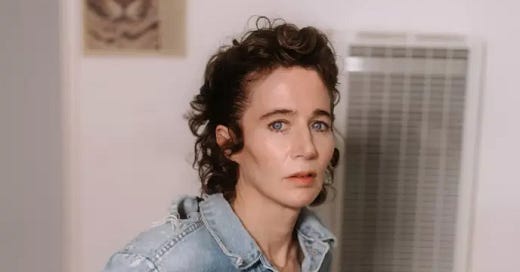Conversations with women (over 40): Miranda July, 50
"Ageing is much wilder and more intense and psychedelic than I expected. My life changed in ways that my thirtysomething self would delight in, would actually be like, I want that."
Back when The Shift book came out, back in 2020 (yes, lockdown baby), whenever anyone asked me what I hoped to achieve, I always gave the same answer: that women in the public eye would start talking about menopause in just the same way as they talk about puberty or pregnancy, sharing information, looking to make each other’s lives easier. Back then, when people were still treating menopause like it was catching, I couldn’t imagine it was going to happen in the near future. How happy am I that I was a little bit wrong? It’s 2024 and everyone is talking about a novel about a perimenopausal woman by Miranda July. “The first great perimenopause novel”, according to the New York Times. Now there’s a sentence I never thought I’d see, let alone in a big old posh newspaper! My dreams have come to pass and how. Miranda and I got together to chat about her experience of “coming out” as no longer young (!), upending her personal life and the unexpected wildness of ageing. Yes, little by little, we’re throwing open the windows and turning on the lights on midlife.
About Miranda: Miranda July is an artist, performer, film maker and writer who has been doing it her own way since she was 16. She has made three films - The Future, Me and You and Everyone We Know and Kajillionaire, held countless exhibitions, written several books, including her much-praised debut novel, The First Bad Man, and won a bunch of awards. You get the picture. Now 50, Miranda has turned her attention to midlife with her first novel in a decade. All Fours is a painful, poignant, hilarious and extremely hot exploration of what happens when “a curious, creative, sexually active woman reaches the midpoint of her life, goes off the oestrogen cliff and starts to question her direction?” It is wholly unlike anything else I’ve read about this life stage. And is sure to change a few games.
Sam: Before we start, tell me where you are, are you in your workspace? The place that you lived in before you got together with your partner?
Miranda: Yeah, the place that I rented for 20 years. And when I met Mike I moved to his house, it's really just a few minutes away. The twist is that the whole time I've rented this place, there's been another little house on the same property behind mine. There's a little garden and then this other house. I never went back there, I just ignored that guy who lived there and worked in here. A couple of months ago, he suddenly moved out. I took a peek at the place, it was a wreck, it looked like a drug den or something. (It possibly was!) But it had two bedrooms and I could see that it was valuable, and there's no other little house that's right in the garden behind my studio. And so I spent the last couple of months renovating it, essentially in the only way I know how which is kind of as an artist project with with another artist, and I just moved in. So now I have this kind of compound. That's where I live. And our child goes back and forth. And it's pretty wonderful. For me, it's sort of a dream, a lifelong dream come true.
I think so many people will identify with that. So many people say to me, I still like my partner but I'd rather live on my own.
I should be clear and and say at this point we really are primarily co-parents, but not in the same way exactly as in the book. But it was a long, interesting transformation to the point we’re at now. And it is true that I had always said to him, wouldn't it be nice if we could live in side by side houses? Although now we both have girlfriends and It all looks pretty different, but there is a sense of return.




